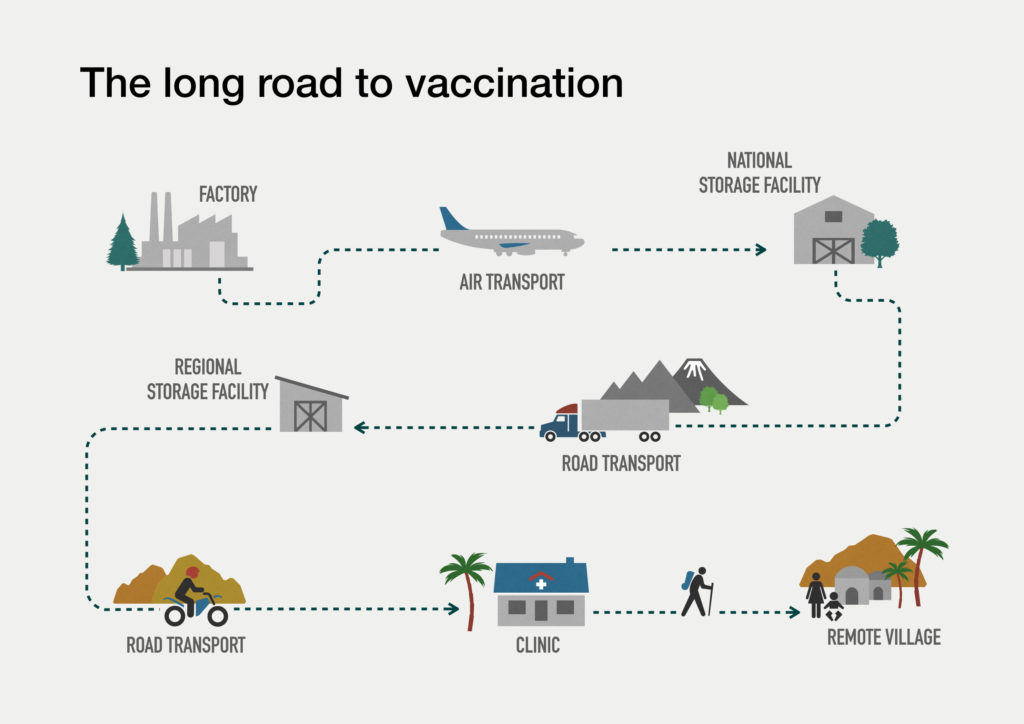- EmpowerAfrica
- ,
Did you know that over 525 million people used the internet in Africa in 2019? If current growth trends continue, almost 75% of Africans are expected to come online by 2030.
The Empower Africa Business Platform is Now Live !!!
By: Leah Ngari
Estimated Reading Time: 3 minutes
According to the World Health Organization, Africa is far from ready for the continent’s largest immunization drive. Data collected by the WHO on immunization readiness from 40 countries revealed only a 33% readiness to roll out the vaccines, a figure that is well below the recommended 80%. In many of the continent’s countries, the complex task of acquiring, distributing, and administering the vaccines is made more difficult by the lack of infrastructure, including electricity and good road networks.
Despite increasing urbanization, more than half the population on the continent lives in rural areas. Governments alone do not have the tools or resources needed to transport, store, or track the vaccines during their journey to remote villages and once they arrive at off-grid clinics. Getting the currently available COVID vaccines to Africa’s rural populations will require cooperation between the public and private sectors.
Most currently available vaccines require maintaining a cold chain during transportation and storage. The Pfitzer vaccine needs to be stored at -70°C, while the Moderna Vaccine needs to be stored at -20 °C. Regular refrigerators, however, do not typically cool below 2°C. The two vaccines would be viable for a much shorter time at that temperature, which risks causing massive wastage from the lack of proper infrastructure to keep them viable enough time until they reach their destination.

While the Covid vaccine rollout has highlighted the need for effective cold-chain infrastructure on the continent, establishing cold storage and transport solutions across the continent will have a lasting positive impact on food security, farmer income, and public health beyond the current crisis.
Below are some of the private-public collaborations working on mapping out and implementing cold-chain logistics in the upcoming vaccination drive:
Operating out of the University of Rwanda, the ACES is a new project to establish and maintain a suitable cold-chain that will link the continent’s logistics providers and farmers with experts and investors. ACES aims to minimize post-harvest food loss and medicine wastage on the continent, improve urban diets, and increase food exports. Researchers are currently identifying Rwanda and Africa’s cold needs to understand how to design the most efficient cold chain solutions.
The current pandemic is not the first time the continent required cold storage for a vaccine. During the 2014-2016 Ebola outbreak, a vaccine developed by Merck also needed to be stored at around -70°C. The Arktek Cold Storage Device was introduced to Sierra Leone in 2014 and helped transport vaccines that immunized hundreds of thousands of Africans.
Global Good, now part of the Bill & Melinda Gates Foundation, developed the device in partnership with Acuma, a Chinese refrigeration company. The device acts like a super-thermos that can maintain temperatures of up to -80°C without using any batteries, electricity, or solar panels. Arktek’s devices are small enough to transport easily and strong enough to withstand harsh transit conditions, making them ideal for transporting vaccines to hard-to-reach places on vehicles, motorbikes, and boats. Countries could use the device to deliver Covid vaccines to people in remote areas without equipped hospitals.
Electricity on the continent is not widespread, but sunlight in most Sub-Saharan African countries is abundant and cheap. As a result, public bodies and startups have started working together to develop a solar-powered refrigeration device to keep the vaccines cold during storage and transport.
PEG Africa, a for-profit solar energy company operating in West Africa, builds solar-powered off-grid solutions for the rural West African market. Some of its products include and pay-as-you-go solar-powered freezers for fishermen and women and solar-powered water pumps for small-holder farmers. Now, the company is collaborating with Power Africa, a public-private partnership facilitated by USAID, to provide solar-powered systems to off-grid clinics in Africa.
Another company driving cold-storage innovation on the continent is Gricd, a Nigerian startup that has designed solar-powered smart cold boxes. Gricd’s goal is to minimize waste of food, medicine, and medical supplies such as blood and plasma and solve the “last mile” problem in rural and remote areas. Since Covid started, the company has been helping transport Coronavirus test samples from remote locations, and its cold boxes are in the process of acquiring PQS certification from the WHO.
Private-public partnerships are leading the way for cold-chain innovation on the continent. These types of partnerships will grow as African countries continue their race against time to deliver vaccines to their populations. The cold storage solutions designed for Covid vaccine transport will continue to serve the continent long after the pandemic is managed.